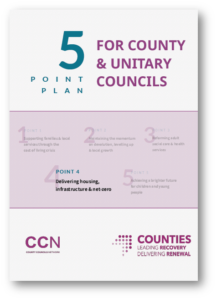
CCN Latest News, CCN News 2022 | 19 October 2022

The County Councils Network (CCN) argues that strategic planning should be a major part of future proposals, likely to be put forward in a forthcoming Planning and Infrastructure Bill. This mechanism could be vital in delivering more homes, better infrastructure, and investment zones, county leaders argue.
The call is made in a CCN’s latest chapter of its Five Point Plan for County and Unitary Councils, which is released today.
 Alongside advocacy on housing and infrastructure, the report calls for counties to be empowered through bespoke budgets in transport. The report also calls on government to move away from an overly city-focused approach on net zero, and provide county areas with an equitable share of climate change funding and policy focus.
Alongside advocacy on housing and infrastructure, the report calls for counties to be empowered through bespoke budgets in transport. The report also calls on government to move away from an overly city-focused approach on net zero, and provide county areas with an equitable share of climate change funding and policy focus.
CCN says that the current planning system is too fragmented, and for years infrastructure has not kept pace with development, leading to overcrowding on roads and public services in some parts of the country.
If the government wants to deliver on its twin aims of housebuilding and growth, then strategic planning is a ‘win-win’. It would ensure that county councils, which are responsible for transport, infrastructure, and the delivery of investment zones work more collaboratively with district councils in their areas, which are responsible for housing and planning.
By better joining up the system and empowering county councils by giving them a statutory role in the planning system could help local authorities ‘zoom out’ and pinpoint the best location for new homes across England’s counties, as well as ensuring that new major new development is backed by the right infrastructure – such as new roads, schools, and health centres.
Strategic planning could also help pave the way for investment zones by ensuring that they are well connected and supported by the right infrastructure, meaning they are more likely to be welcomed by local areas and delivered.
Currently, reforms to the planning system are currently included in the Levelling Up and Regeneration Bill, but CCN says they should be removed from that bill and reshaped proposals included in the recently announced Planning and Infrastructure Bill.
If that bill comes forward, CCN says it should include a power in the bill to introduce strategic planning in county areas, where desired.
Strategic planning has not been a formal part of the planning system since the late 2010s, and currently the only informal tool to encourage those councils to work together is the ‘Duty to Co-operate’ – which the previous government was looking to scrap, meaning there would be no mechanism to encourage local councils to work together.
Today’s report includes the following recommendations:
 Cllr Roger Gough, Planning and Infrastructure Spokesperson for the County Councils Network said:
Cllr Roger Gough, Planning and Infrastructure Spokesperson for the County Councils Network said:
“We welcome the prospect of the government bringing forward new proposals to reform the planning system in a forthcoming Planning and Infrastructure Bill. Over a number of years there has been far too much focus on headline housebuilding numbers, rather than on planning as a whole, and on the infrastructure that is needed to make developments viable in the long-term.
“The new bill should contain a power to re-introduce strategic planning into the system, which would be a win-win for a government looking to build more homes and generate economic growth. By giving county councils a renewed role to work collaboratively with district councils in their area, we can come together to plan for houses in the right areas, backed by the necessary infrastructure, and ensure that investment zones get off the ground quickly.
“The County Councils Network has long argued for a collaborative model of strategic planning and form reforms to the developer contributions system. Taken together, these easily implementable reforms could yield significant results in creating better communities and unlocking development.”
© 2024 County Councils Network | Credits | Site map | Cookies | Privacy Policy.